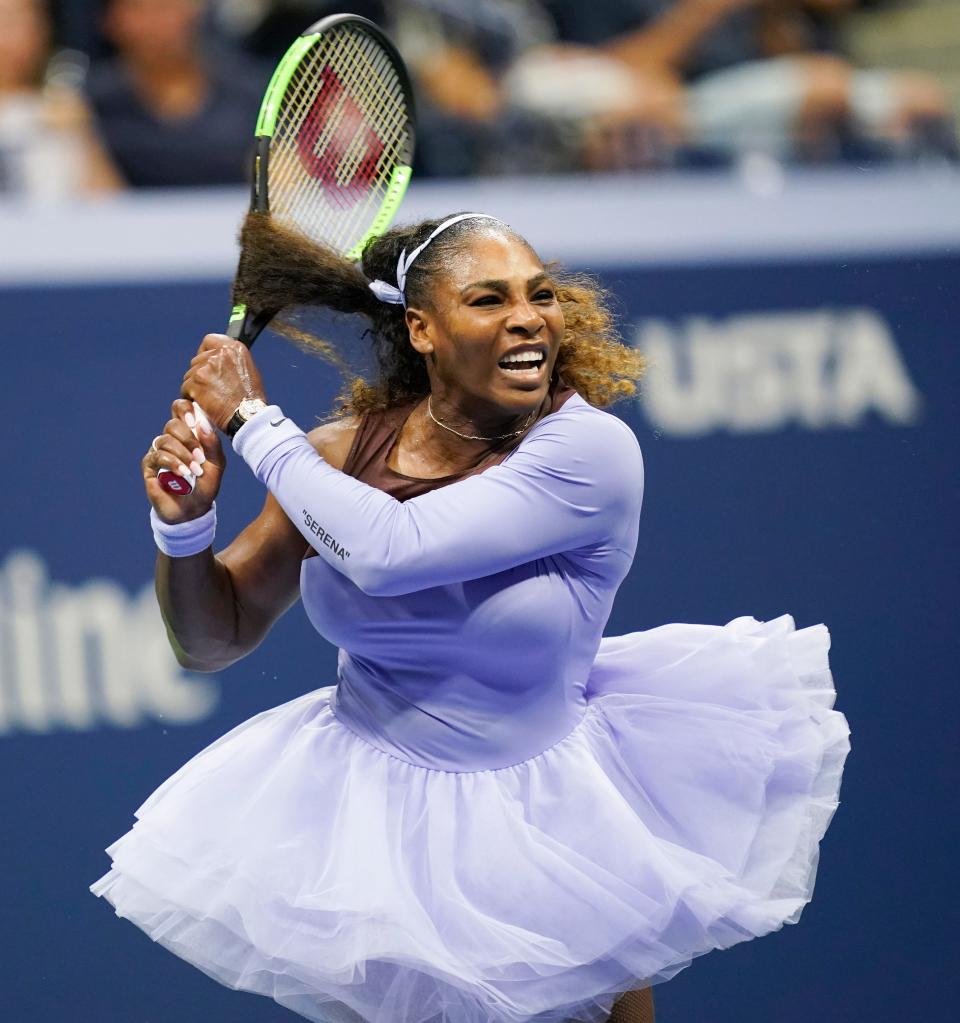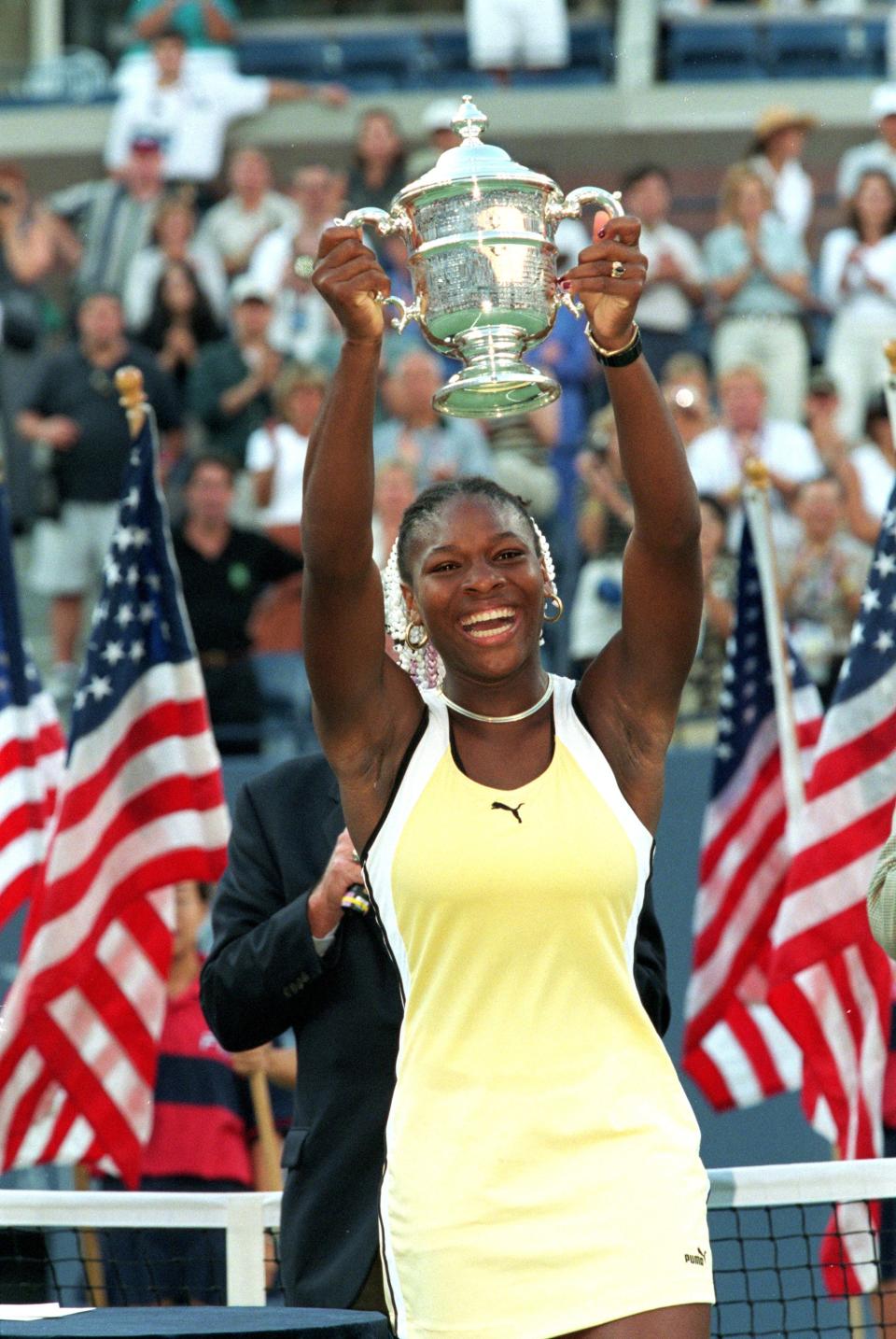'You might as well do you': Serena Williams and the never-ending struggle to balance work, family
- Oops!Something went wrong.Please try again later.
- Oops!Something went wrong.Please try again later.
Serena Williams has lived a lifetime of firsts in her 40 years. And the tennis champion added another twist to her ample resume last week: retirement.
In a long, honest and provocative essay for Vogue, Williams said her desire to have a second child with husband Alexis Ohanian – and its associated health risks and parental obligations – meant saying farewell to a sport she has loved, dominated and redefined.
Once again, experts say, Williams has stayed true to her authentic self in a way that will serve as both inspiration to other women at such crossroads as well as a catalyst for change in sport.
“Serena was criticized for being vocal on court, for her hair, for being from Compton, for her body type, for the clothes she wore, for having a baby, for coming back after having a baby, so I’m just appreciative to have been able, particularly as a Black woman, to share in some understanding of her lived experience,” says Akilah Carter-Francique, dean of the school of education, health and human services at Benedict College in South Carolina.
In case you missed: Sports icons Serena Williams, Simone Biles, Venus Williams among USA TODAY Women of the Century

“She’s simply saying, ‘I’m human, and at some point we all have to transition and step into a new aspect of our lives,’” she says. “Throughout her career, despite criticism, she forged ahead and said I’m making these choices for me and my family. She’s saying, ‘You’ll get pushback no matter what you do, so you might as well do you.’”
More specifically, Williams’ declaration of independence has the potential to deepen conversations around the changes needed in professional women’s sports, whether freezing tennis rankings after delivery or holding soccer roster positions during maternity leave.
“Serena may be unique in many ways, but she isn’t alone in that many women in sports have spoken out about the lack of support for mothering,” says Rachel Allison, associate professor in the department of sociology at Mississippi State University.
“It’s fascinating to see someone with such power and wealth and fame who still feels that being a mother and competing at a high level are incompatible goals for a woman when compared to a man,” says Allison. “Her feeling is, she can’t have it all.”
Why we'll miss her: One of us learned to play tennis with a Serena racket. One of us met Serena.

In her Vogue essay, Williams was blunt and about the sacrifice required to give her daughter – Alexis Olympia Ohanian, Jr., 5, who goes by Olympia – a sibling.
“Believe me, I never wanted to have to choose between tennis and a family. I don’t think it’s fair,” Willaims wrote. “If I were a guy, I wouldn’t be writing this because I’d be out there playing and winning while my wife was doing the physical labor of expanding our family. Maybe I’d be more of a Tom Brady if I had that opportunity.”
Important: To many Black people, Serena Williams is us, and we are her | Opinion
Women still expected to be 'primary caregivers'
Allison says that despite strides made by men in the past decades in terms of shouldering more of the responsibility of child rearing, “there’s still an expectation in heterosexual families that the woman will be the primary caregiver, dealing with the feeding and the bathing and the transporting. Not being there for that often generates feelings of guilt.”
Williams allows in her essay that she has the resources to ensure great care for her child. But she found she could not and would not abdicate that responsibility.
“My husband will tell you I am too hands-on,” she wrote. “In five years, Olympia has only spent one 24-hour period away from me. This past year, while I was recovering from a hamstring injury, I got to pick her up from school four or five days a week, and I always looked forward to seeing her face light up when she walked out of the building and saw me waiting there for her. The fact is that nothing is a sacrifice for me when it comes to Olympia.”

Letisha Engracia Cardoso Brown, assistant professor in the department of sociology at the University of Cincinnati, says she cried when she read Williams’ farewell letter.
Partly out of sadness, as it represented the end of a career she had followed with awe from its inception. But partly out of pride and awe in a gesture bound to have a ripple effect.
Serena at the Open: U.S. Open becomes must see TV event of summer with Serena Williams send off
“She makes so many things possible simply by using her immense platform to talk about motherhood,” says Brown. “But make no mistake, what she’s also saying here is that you don’t have to be limited by the expectations of what the dominant culture dictates.”
Brown also points out that Williams’ brief mention in Vogue of conversations with her therapist also strikes a blow against a cultural taboo against seeking out such professional help.

“By doing that, she opens up space for others to do the same,” she says. “It's not an easy thing to admit, knowing all the stigma around therapy and Black women. But it’s a real thing, look at Naomi Osaka and Simone Biles (the tennis player and gymnast who were criticized for stepping away due to mental strain). There’s no doubt our minds and bodies are connected, and if you’re not in a mental space to execute, you can hurt yourself.”
Williams raises the reality of pregnancy dangers for Black women
Another topic Williams raised in the essay is the inherent danger in pregnancy for older women, particularly women of color.
“If you know the horrors and traumas associated with being a pregnant Black woman in this country, you know what she’s talking about,” says Brown.
Black women are three times more likely to die as a result of pregnancy than white women, according to a study by the Centers for Disease Control and Prevention. Factors include “variation in quality healthcare, underlying chronic conditions, structural racism and implicit bias.”
More: Serena Williams says she intends to retire from tennis after US Open in Vogue's September issue

In her goodbye essay, Williams made clear that she gave tennis her all after giving birth to her daughter. That exalted experience led to a shortness of breath that troubled the tennis star. She had to convince doctors to investigate, which led to a life-saving procedure to eliminate a blood clot.
The four-time Olympic gold medalist and winner of 23 Grand Slam championships was pursuing Margaret Court’s record of 24 pre-Open era wins with vigor, pushing through hardships in the process.
“I had my chances after coming back from giving birth,” she wrote. “I went from a C-section to a second pulmonary embolism to a grand slam final. I played while breastfeeding. I played through postpartum depression. But I didn’t get there. Shoulda, woulda, coulda. I didn’t show up the way I should have or could have.
“But I showed up 23 times, and that’s fine. Actually it’s extraordinary. But these days, if I have to choose between building my tennis resume and building my family, I choose the latter.”

There’s a sense of peace in that line, a feeling of being true to oneself that puts one beyond the incessant barbs of our commentary-happy culture.
“I don’t have any sadness for her at all, I’m excited for her,” says Carter-Francique, noting that Williams’ new goals include not only having a second child but also pouring time and money into supporting women and businesses of color through Serena Ventures, her investment company.
Allison is eager to see if Williams’ bow by Vogue ultimately will “contribute to real changes in policies and cultural ideas surrounding women in sports, (but) we’ll have to wait and see.”
For Brown, the bottom line is simple. “Serena has shown so many of us that you can be strong and powerful and yet not male or white,” she says. “For so many reasons now, she is, at the end of the day, the greatest of all time.”
This article originally appeared on USA TODAY: Serena Williams and the never-ending struggle to balance work, family

